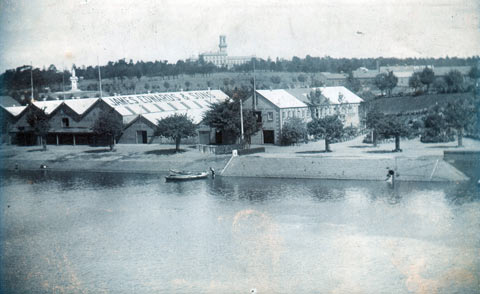History of Essendon Rowing Club, 1880-1980
Table of Contents
Chapters
- The Origins of the Sport
- The Development of the Sport
- The Founding of the Club - 1880-89
- Inter-club Competition - 1890-99
- Federation and Senior Success - 1900-09
- The War Years - 1910-19
- Recovery from the War - 1920-29
- Jubilee Year and Beyond - 1930-39
- Another War, Another Recovery - 1940-49
- Junior Sucess Again - 1950-59
- Senior Rise to the Top - 1960-69
- The New Clubhouse - 1970-79
Appendices
4. Inter-Club Competition - 1890-1899
The first crew to compete in an outside regatta was a Maiden Four to Warrnambool's first in 1890. "The crew was Fred Edgar (Stroke), C. Joynes (3), Brotherton (2), E. Chic Fleming (Bow), but unfortunately they were badly beaten…" (from a letter from Brotherton. 1930).
Towards the end of 1891, it was decided that the Essendon Rowing Club (E.R.C.) should participate more in public regattas and in the February of the following year the first maiden eight competed at the Richmond Regatta and won by a few feet from Albert Park. The crew was G.W. Ryan (Bow), P. Bruce (2), E.J. McCheane (3), W.J. Liscomb (4), S. Breese (5), W. Patterson (6), W.C. Aitkin (7) and J.A. Brotherton (Stroke). Coxwain Wm. C. Edwards and coach was A.J. Shepherd. The cox was one of the partners of a renowned firm of boat builders - James Edwards and Sons. Essendon won their first maiden Four at the Richmond Regatta in 1893.

Edwards Boat Sheds just after construction of the current Princes Bridge
Records are not available for the first decade of the E.R.C. In October 1898 the Annual General Meeting was held at the Junction Hotel, Moonee Ponds. The chair was taken by Mr Towit in the absence of the President Alex McCracken, the Secretary reported that the club had a credit balance of £85. The patrons of the Club were the Honourable Thomas Brunton, the Honourable Alfred Deakin and the Honourable S.T. Stauchton.
A resolution was passed on January 28th, 1899 that the club would pay the freight on boats used in outside regattas although the crew were to stand their own and the cox's expenses. The Club had a very busy social year striving to raise funds because many subscriptions were unpaid.
The next year continued in the same strain - Invitation Days for the fairer sex, complete with Brass Band Music - Di Gilo's Band, Fancy dress, swimming, boat rides on the river followed by afternoon tea. Club races recorded this year were the scratch fours and a fee of one shilling per oar was charged to defray the cost of the trophies which were always presented to the winning crews. If the Club was unfinancial, trophies would be donated and the donor would have the race named in his honour.
